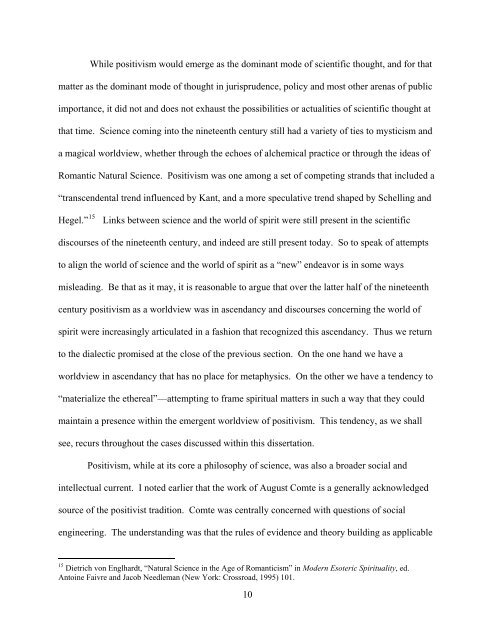A Genealogy of the Extraterrestrial in American Culture
A Genealogy of the Extraterrestrial in American Culture
A Genealogy of the Extraterrestrial in American Culture
Create successful ePaper yourself
Turn your PDF publications into a flip-book with our unique Google optimized e-Paper software.
While positivism would emerge as <strong>the</strong> dom<strong>in</strong>ant mode <strong>of</strong> scientific thought, and for that<br />
matter as <strong>the</strong> dom<strong>in</strong>ant mode <strong>of</strong> thought <strong>in</strong> jurisprudence, policy and most o<strong>the</strong>r arenas <strong>of</strong> public<br />
importance, it did not and does not exhaust <strong>the</strong> possibilities or actualities <strong>of</strong> scientific thought at<br />
that time. Science com<strong>in</strong>g <strong>in</strong>to <strong>the</strong> n<strong>in</strong>eteenth century still had a variety <strong>of</strong> ties to mysticism and<br />
a magical worldview, whe<strong>the</strong>r through <strong>the</strong> echoes <strong>of</strong> alchemical practice or through <strong>the</strong> ideas <strong>of</strong><br />
Romantic Natural Science. Positivism was one among a set <strong>of</strong> compet<strong>in</strong>g strands that <strong>in</strong>cluded a<br />
“transcendental trend <strong>in</strong>fluenced by Kant, and a more speculative trend shaped by Schell<strong>in</strong>g and<br />
Hegel.” 15<br />
L<strong>in</strong>ks between science and <strong>the</strong> world <strong>of</strong> spirit were still present <strong>in</strong> <strong>the</strong> scientific<br />
discourses <strong>of</strong> <strong>the</strong> n<strong>in</strong>eteenth century, and <strong>in</strong>deed are still present today. So to speak <strong>of</strong> attempts<br />
to align <strong>the</strong> world <strong>of</strong> science and <strong>the</strong> world <strong>of</strong> spirit as a “new” endeavor is <strong>in</strong> some ways<br />
mislead<strong>in</strong>g. Be that as it may, it is reasonable to argue that over <strong>the</strong> latter half <strong>of</strong> <strong>the</strong> n<strong>in</strong>eteenth<br />
century positivism as a worldview was <strong>in</strong> ascendancy and discourses concern<strong>in</strong>g <strong>the</strong> world <strong>of</strong><br />
spirit were <strong>in</strong>creas<strong>in</strong>gly articulated <strong>in</strong> a fashion that recognized this ascendancy. Thus we return<br />
to <strong>the</strong> dialectic promised at <strong>the</strong> close <strong>of</strong> <strong>the</strong> previous section. On <strong>the</strong> one hand we have a<br />
worldview <strong>in</strong> ascendancy that has no place for metaphysics. On <strong>the</strong> o<strong>the</strong>r we have a tendency to<br />
“materialize <strong>the</strong> e<strong>the</strong>real”—attempt<strong>in</strong>g to frame spiritual matters <strong>in</strong> such a way that <strong>the</strong>y could<br />
ma<strong>in</strong>ta<strong>in</strong> a presence with<strong>in</strong> <strong>the</strong> emergent worldview <strong>of</strong> positivism. This tendency, as we shall<br />
see, recurs throughout <strong>the</strong> cases discussed with<strong>in</strong> this dissertation.<br />
Positivism, while at its core a philosophy <strong>of</strong> science, was also a broader social and<br />
<strong>in</strong>tellectual current. I noted earlier that <strong>the</strong> work <strong>of</strong> August Comte is a generally acknowledged<br />
source <strong>of</strong> <strong>the</strong> positivist tradition. Comte was centrally concerned with questions <strong>of</strong> social<br />
eng<strong>in</strong>eer<strong>in</strong>g. The understand<strong>in</strong>g was that <strong>the</strong> rules <strong>of</strong> evidence and <strong>the</strong>ory build<strong>in</strong>g as applicable<br />
15 Dietrich von Englhardt, “Natural Science <strong>in</strong> <strong>the</strong> Age <strong>of</strong> Romanticism” <strong>in</strong> Modern Esoteric Spirituality, ed.<br />
Anto<strong>in</strong>e Faivre and Jacob Needleman (New York: Crossroad, 1995) 101.<br />
10















